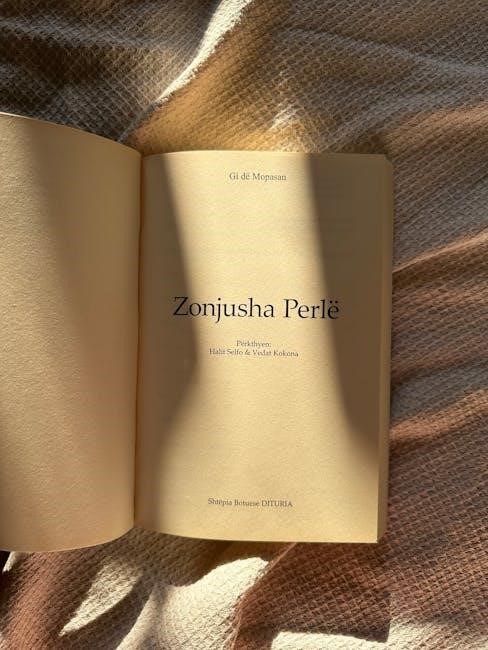Robert Fitzgerald’s translation of The Odyssey is a masterpiece of poetic interpretation, blending fidelity to Homer’s original with lyrical English prose, making it a timeless classic.
Background and Significance of Fitzgerald’s Work
Robert Fitzgerald’s translation of The Odyssey holds a esteemed place in literary history, renowned for its poetic precision and fidelity to Homer’s original text. First published in 1961, it earned the Bollingen Award, solidifying its reputation as a landmark work. Fitzgerald’s approach balanced scholarly accuracy with artistic expression, making the epic accessible while preserving its ancient essence. His translation is celebrated for its lyrical prose and rhythmic cadence, which resonate deeply with modern readers. As a result, it has become a standard in classical literature, widely studied and admired, ensuring Fitzgerald’s legacy as a master translator of ancient Greek poetry.
Overview of The Odyssey and Its Cultural Impact
The Odyssey, Homer’s ancient Greek epic, chronicles Odysseus’s decade-long journey home after the Trojan War, exploring themes of perseverance, loyalty, and humanity. Its influence spans millennia, shaping Western literature and culture. Fitzgerald’s translation has played a pivotal role in popularizing the epic, ensuring its relevance for modern audiences. The poem’s vivid characters, such as Odysseus, Penelope, and Telemachus, resonate universally, while its narrative of struggle and triumph continues to inspire art, literature, and film. As a foundational text, The Odyssey remains a cornerstone of education and cultural discourse, bridging ancient and contemporary worlds. Its enduring appeal lies in its timeless exploration of human nature and destiny.

Key Features of the Fitzgerald Translation
Robert Fitzgerald’s translation excels in its balance of poetic lyricism and fidelity to Homer’s original text, offering clear, engaging prose that preserves the epic’s timeless essence.
Language and Style in Fitzgerald’s Rendering
Robert Fitzgerald’s translation of The Odyssey is celebrated for its poetic elegance and clarity. His use of English prose captures the epic’s grandeur while maintaining readability. Fitzgerald’s language is both lyrical and precise, blending modern accessibility with the timeless essence of Homer’s original text. His meter and diction strike a balance between poetic interpretation and fidelity to the source material; The translation avoids archaic language, making the ancient tale resonate with contemporary readers. Fitzgerald’s style preserves the emotional depth and complexity of the original, ensuring that the epic’s themes of perseverance, wisdom, and human struggle remain vivid and relatable. His rendering is widely regarded as a masterful bridge between antiquity and modernity.
Fidelity to the Original Text and Poetic License
Robert Fitzgerald’s translation of The Odyssey strikes a remarkable balance between fidelity to Homer’s original Greek text and creative poetic license. While remaining true to the epic’s structure and themes, Fitzgerald adapts the language to resonate with modern readers. His rendering preserves the emotional depth and complexity of the original, ensuring that the essence of Homer’s poetry shines through. Fitzgerald’s translation won the 1961 Bollingen Award for its masterful blend of accuracy and artistry. By maintaining the original’s spirit while crafting a compelling narrative in English, Fitzgerald’s work stands as a testament to the enduring relevance of The Odyssey in contemporary literature.

Reception and Popularity of the Fitzgerald Translation
Robert Fitzgerald’s translation of The Odyssey has received widespread acclaim for its lyrical prose and emotional depth, making it a beloved and enduring classic in literature.
Critical Acclaim and Awards
Robert Fitzgerald’s translation of The Odyssey has garnered widespread critical acclaim for its poetic precision and emotional depth. It won the prestigious Bollingen Award in 1961, recognizing it as a masterful rendition of Homer’s epic. Critics praise Fitzgerald’s ability to balance fidelity to the original Greek text with a lyrical, modern English style. The Wall Street Journal highlighted its timeless appeal, noting that “no Hellene could do it better.” This translation is often regarded as a benchmark for modern interpretations, blending scholarly rigor with poetic flair, ensuring its place as a literary classic. Its enduring popularity underscores Fitzgerald’s skill in making ancient verse resonate with contemporary readers.
Comparison with Other Translations of The Odyssey
Robert Fitzgerald’s translation of The Odyssey stands out among others for its poetic elegance and emotional resonance. While translators like Richmond Lattimore and Robert Fagles offer more literal interpretations, Fitzgerald balances fidelity to Homer’s original with a lyrical, modern English style. His version is often praised for its readability and ability to evoke the epic’s timeless themes. Fitzgerald’s translation is considered a benchmark, blending scholarly accuracy with artistic expression, making it a preferred choice for both scholars and general readers. Its enduring popularity highlights Fitzgerald’s unique ability to preserve the essence of Homer’s masterpiece while rendering it accessible to contemporary audiences.

Accessing the Fitzgerald Translation in PDF Format
The Odyssey translated by Robert Fitzgerald is available in PDF format through legitimate sources like libraries, eBook platforms, and academic databases, ensuring easy and legal access for readers.
Legitimate Sources for Downloading the PDF
To legally access The Odyssey translated by Robert Fitzgerald in PDF format, consider reputable sources like Project Gutenberg, Google Books, or the Internet Archive, which offer free, lawful downloads. University libraries and academic databases, such as JSTOR or ProQuest, often provide access to classic works, including Fitzgerald’s translation. Additionally, purchasing the eBook from publishers like Penguin or Vintage ensures a high-quality, authorized version. Always avoid illegal download sites to support authors and publishers. These platforms ensure that you can enjoy Fitzgerald’s acclaimed translation while respecting copyright laws.
Important Considerations for Digital Access
When accessing The Odyssey translated by Robert Fitzgerald in digital formats, ensure that you are using legitimate sources to avoid copyright infringement. Many websites offering free downloads may violate intellectual property laws, leading to potential legal consequences. Additionally, be cautious of poorly formatted or unofficial PDFs, as they may contain errors or lack the quality of the original publication. Opting for reputable platforms not only supports the work of authors and publishers but also guarantees a superior reading experience. Always verify the source’s credibility and consider purchasing from authorized retailers to obtain a reliable and lawful digital copy of this timeless masterpiece. Reading digitally should be both convenient and ethical, preserving the integrity of the original text while respecting the rights of its creators.
Structure and Content of The Odyssey
The Odyssey is an epic poem divided into 24 books, chronicling Odysseus’s journey home after the Trojan War. It explores themes of perseverance, loyalty, and divine intervention, blending adventure with profound insights into human nature. The narrative is enriched with flashbacks, prophecies, and vivid characterizations, creating a timeless tale of heroism and survival. Fitzgerald’s translation masterfully preserves the original’s poetic essence while rendering it accessible to modern readers, ensuring the epic’s enduring appeal.
Major Themes and Narrative Arcs
The Odyssey explores universal themes such as the journey home (nostos), the struggle between fate and free will, and the importance of loyalty and perseverance. Odysseus’s ten-year voyage, filled with challenges like the Cyclops, Sirens, and whirlpools, tests his cunning and resilience. Meanwhile, in Ithaca, the narrative arc of Penelope and Telemachus highlights the tension of waiting and the battle against suitors vying for Penelope’s hand. Fitzgerald’s translation captures the emotional depth of these themes, rendering the epic’s complex characters and their moral dilemmas with clarity. The poem’s structure, blending action with reflection, ensures its enduring relevance, offering insights into humanity’s eternal quest for home and identity.
Key Characters and Their Roles
Odysseus, the cunning King of Ithaca, is the central figure, whose wisdom and resilience drive the narrative. His wife, Penelope, embodies loyalty and cleverness, outwitting suitors while awaiting his return. Their son, Telemachus, evolves from a naive youth to a determined leader, aiding his father in reclaiming their kingdom. Athena, Odysseus’s divine ally, provides critical guidance, while Poseidon opposes him, testing his resolve. Antagonists like the Cyclops Polyphemus and the Sirens represent the obstacles he must overcome. Fitzgerald’s translation vividly portrays these characters, capturing their complexities and the interplay of human and divine forces that shape the epic’s journey.
Historical Context of the Fitzgerald Translation
Robert Fitzgerald’s translation of The Odyssey emerged in 1961, a period of renewed interest in classical literature. His work bridged ancient Greek poetry with modern English, enhancing accessibility while preserving the epic’s timeless essence.
The Time Period and Fitzgerald’s Approach
Robert Fitzgerald’s translation of The Odyssey was published in 1961, a period marked by a resurgence of interest in classical literature. Fitzgerald’s approach emphasized balancing fidelity to Homer’s original Greek text with a lyrical, modern English style. He sought to capture the poetic essence of the epic while making it accessible to contemporary readers. His translation is notable for its use of iambic pentameter, which lends a musical quality to the narrative. Fitzgerald’s work was part of a broader movement to revitalize ancient texts for modern audiences, ensuring that The Odyssey remained relevant and engaging in the 20th century.
Impact of the Translation on Modern Readers
Robert Fitzgerald’s translation of The Odyssey has profoundly impacted modern readers by bridging the gap between ancient Greek poetry and contemporary English. His lyrical prose preserves the epic’s poetic essence while making it accessible to a wide audience. Fitzgerald’s work has introduced Homer’s masterpiece to generations of readers who might otherwise find classical texts daunting. The translation’s clarity and musicality have ensured that The Odyssey remains a vital part of literary canon, resonating with themes of journey, identity, and resilience. Its enduring popularity underscores Fitzgerald’s success in adapting a timeless story for modern sensibilities, ensuring its relevance in the 21st century.
Robert Fitzgerald’s translation of The Odyssey stands as a timeless classic, blending poetic fidelity with modern accessibility. Its enduring popularity in PDF format underscores its universal relevance, ensuring the epic’s continued influence on literature and readers alike.
Legacy of Fitzgerald’s Translation
Robert Fitzgerald’s translation of The Odyssey has left an indelible mark on literary history. His poetic rendering, balancing fidelity to Homer’s original and lyrical English, has made the epic accessible to modern readers; Since its publication in 1961, the translation has remained in print, earning widespread acclaim and numerous awards. Fitzgerald’s work is celebrated for its ability to preserve the essence of ancient Greek poetry while resonating with contemporary audiences. The availability of this translation in PDF format has further cemented its legacy, ensuring that Homer’s timeless story continues to inspire and educate readers globally. Fitzgerald’s contribution remains a cornerstone of classical literature in the modern era.

Final Thoughts on The Odyssey and Its Enduring Relevance
The Odyssey, as translated by Robert Fitzgerald, remains a cornerstone of world literature, offering timeless insights into human nature, perseverance, and the complexities of life. Its themes of heroism, cunning, and the quest for home resonate across cultures and generations. Fitzgerald’s translation has played a pivotal role in keeping Homer’s epic accessible, ensuring its relevance in modern times. The availability of this work in PDF format has further expanded its reach, allowing readers to engage with the ancient tale in a contemporary medium. The Odyssey’s enduring appeal lies in its universal themes, making it a work that continues to inspire and influence art, literature, and thought to this day.